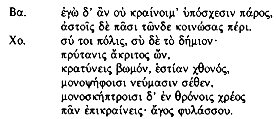|
|
|
|
|
|
|
In either case, the omnipotence of the divine Father is a result of the child's view of her own father, not only because the parent must in fact seem omnipotent to the child, but also because, in the oedipal situation, the child transfers to the new love-object the same fantasies she had entertained about herself during that earlier period when, sheltered from reality, she had conceived the "dream of narcissistic omnipotence in a world of love and pleasure" (Brown 1959: 113). This transference represents, in Jones' words, "a substitute for the primary narcissism and feeling of omnipotence which the child is unable to sustain in the face of experience, a failure which is largely contributed to by the presence of the obviously powerful Father" (1923: 355). |
|
|
|
|
|
|
|
|
The question of omnipotence occurs again in the attitude of the Danaids toward Pelasgos, king of Argos. Most critics have been puzzled by the discrepancy between this attitude and Pelasgos' apparent inability to act without the consent of his citizens. The position of Pelasgos, regarded by one critic (Diamontopoulos 1957) as an anachronism which reveals the true date of the play, is seen by another as "the center of [Aeschylus'] thinking in this play, as it certainly is the center of its tragic feeling" (Kitto 1961: 10). The existential dilemma of Pelasgos notwithstanding, we should not neglect the way in which his role, like those of Danaos and Zeus, must be seen in terms of the fantasies of the Danaids. The crucial passage is as follows: |
|
|
|
|
|
|
|
|
 |
|
|
|
|
 |
|
 |
|
|
King: |
|
|
|
|  |
|
 |
|
|
But I would fulfill no promise before
I have shared these matters with all the citizens. |
|
|
|
|  |
|
 |
|
|
Chorus: |
|
|
|
|  |
|
 |
|
|
But you are the city, you are the people.
The ruler is not judged.
You rule the altar and hearth of the land, by the command of your solitary vote;13
from the throne with solitary scepter |
|
|
|
| |
|
|
|
|
13 LSJ, s.v.  attributes the phrase attributes the phrase  to Zeus, a Freudian slip! to Zeus, a Freudian slip! |
|
|
|
|
|
|
|